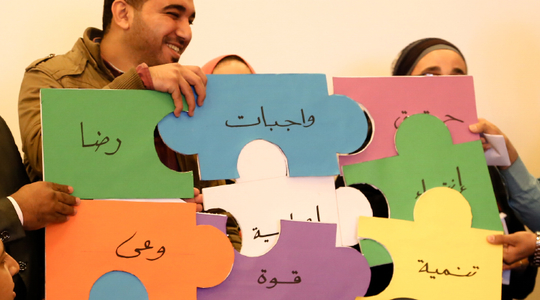This simulation game focuses on promoting the universal values of Humanity, Equality, Honesty, Justice and Freedom. The participants will increase their awareness of value-based decision-making. During the evaluation-phase the participants try to anticipate challenges in applying value-based decision-making in their real lives. The simulation game explicitly highlights the differences between short-term and long-term effects of decisions and stresses the importance of using values as a guiding reference while taking decisions. However, during the evaluation questions like why should we follow values in our lives and how prioritize among values will be discussed.
Scenario & Procedure
In order to tackle the five values mentioned above, the scenario focuses on the personal level. Therefore, we created a fictitious scenario in a small village, with the community leader (Nidal) in the very centre. While suffering from a serious sickness, Nidal reflects about his life and the crucial decision he took. At that stage, he decides to tell his family members his lifelong secret: an ancient, extremely valuable artifact is buried in the backyard of his house. However, the information spreads rapidly among the villagers and different interests collide. Now, participants have to negotiate with other actors in order to develop a proposal that is supported by as many actors as possible. The goal to find a majority, to please the last wish of Mr. Nidal and to contribute to the welfare of the village
Objectives
This simulation game is modeled after real conflict situations and refers to the diverse causes for conflict. The participants realize how complex such conflict situations can be and that resolutions should be as comprehensive as possible. The simulation game shows the dynamic nature of conflicts, and provides a base to discuss questions like how to still follow their values even in challenging situations and what are first steps to a sustainable peace agreement. The fictional scenario is a helpful way of discussing the possible solutions in an experimental environment.
Learning Goals
- Reflecting about values and why we should follow values in our lives
- Teamwork within the respective interest groups and between larger coalitions
- Personal negotiations skills in order to persuade others and to organize majorities
- Develop and test alternative problem-solving approaches when it comes to negotiating agreements


